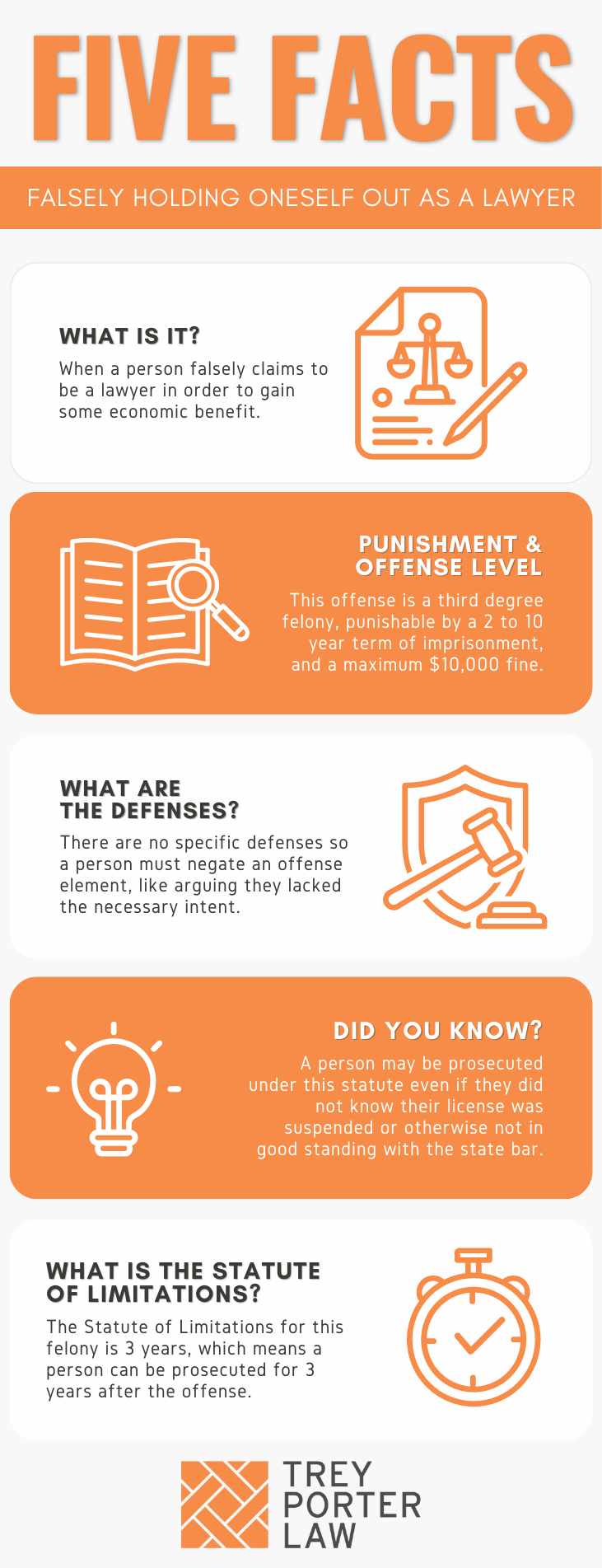WHAT IS FALSELY HOLDING ONESELF OUT AS A LAWYER IN TEXAS?
The Texas law against falsely holding oneself out as a lawyer prohibits misrepresenting to another that a person is an attorney, with the intent to gain an economic benefit.

WHAT IS THE FALSELY HOLDING ONESELF OUT AS A LAWYER LAW IN TEXAS?
Tex. Penal Code § 38.123. FALSELY HOLDING ONESELF OUT AS A LAWYER.
(a) A person commits an offense if, with intent to obtain an economic benefit for himself or herself, the person holds himself or herself out as a lawyer, unless he or she is currently licensed to practice law in this state, another state, or a foreign country and is in good standing with the State Bar of Texas and the state bar or licensing authority of any and all other states and foreign countries where licensed.
(b) An offense under Subsection (a) of this section is a felony of the third degree.
WHAT IS THE PENALTY CLASS FOR FALSELY HOLDING ONESELF OUT AS A LAWYER IN TEXAS?
Falsely holding oneself out as a lawyer is a third degree felony, punishable by two to ten years in prison.
WHAT IS THE PUNISHMENT RANGE FOR FALSELY HOLDING ONESELF OUT AS A LAWYER IN TEXAS?
The punishment range for falsely holding oneself out as a lawyer, a third degree felony, is between two to ten years in prison, and a maximum $10,000 fine.
WHAT ARE THE PENALTIES FOR FALSELY HOLDING ONESELF OUT AS A LAWYER IN TEXAS?
A person charged with falsely holding himself out as a lawyer may be eligible for probation after a conviction, or deferred without a conviction, for a period not to exceed ten years.
WHAT ARE THE DEFENSES TO FALSELY HOLDING ONESELF OUT AS A LAWYER IN TEXAS?
The false-lawyer statute provides no exceptions or affirmative defenses. A defendant on trial for falsely holding oneself out as a lawyer may raise any defense, or attempt to negate at least one of the elements the State must prove at trial.
- Can a person be charged with falsely holding oneself out as a lawyer if the person did not know their law license was suspended or revoked? One’s mistaken belief about his law license will not absolve him of criminal responsibility. This is because a defendant is only entitled to a mistake-of-fact jury instruction if he had a mistaken belief that would negate the required culpable mental state of the offense. The false-lawyer statute does not require the State to prove a defendant knew he was not licensed or in good standing—it simply requires the intent to gain an economic benefit through the unauthorized practice of law. If a person practices law without a license for pecuniary gain, he has falsely held himself out as a lawyer.
- Can a person give free legal advice or services without a law license in Texas? Purely gratuitous comments on legal matters are not criminalized under this law. People who perform free legal services or give free advice may risk exposure to prosecution for other crimes, but the false-lawyer statute requires proof of the intent to gain an economic benefit.
WHAT IS THE STATUTE OF LIMITATIONS FOR FALSELY HOLDING ONESELF OUT AS A LAWYER IN TEXAS?
The limitation period for falsely holding oneself out as a lawyer, a third degree felony, is three years.
FALSELY HOLDING ONESELF OUT AS A LAWYER IN TEXAS
The false-lawyer statute imposes the duty to maintain professional licensing qualifications on any purportedly practicing law for economic gain. It is intended to protect the public from untrained individuals who may endanger the public’s personal and property rights, as well as the orderly administration of the judicial system.
TEXAS FALSELY HOLDING ONESELF OUT AS A LAWYER COURT CASES
The case law regarding falsely holding oneself out as a lawyer in Texas shows a person may be convicted of a felony for a single misrepresentation to another that he or she is an attorney.
- In Rodriguez v. State, the defendant was a notary public, not an attorney, who ran an office for “immigration services.” She charged fees for filing paperwork, and told a man who hired her for immigration help that she was an attorney. Although her signs and business cards did not specifically identify her as an attorney, the jury found she held herself out as a lawyer—on at least one occasion—for payment.The appellate court upheld the conviction, explaining that the jury was entitled to believe the man’s testimony that the defendant told him she was an attorney.
- In Celis v. State, the defendant misrepresented that he was licensed to practice in Mexico, and was admitted to the Texas bar in 2000. He was convicted of falsely holding himself out as a lawyer upon proof that he was not licensed, and accepted over $1.3 million in attorney’s fees.On appeal, the defendant claimed he was entitled to rely on his mistaken belief that he was licensed and in good standing. The Texas Court of Criminal Appeals affirmed the conviction, holding that ignorance of the law, and state bar requirements, is no excuse. Proof the defendant financially benefited for legal work without being licensed was sufficient to sustain his conviction.
















